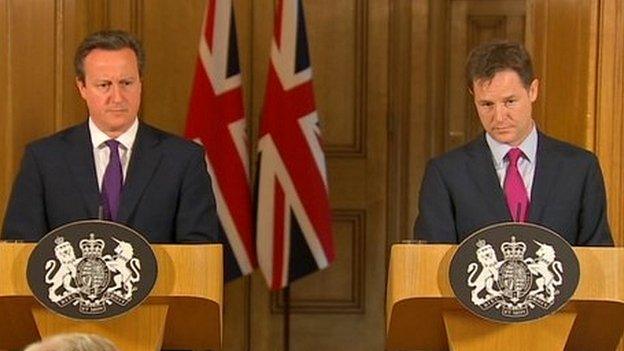MPs to seek judicial review of emergency data law
- Published

Tom Watson and David Davis criticised the government's timetable for passing the legislation
Two MPs have said they will be seeking a judicial review of the emergency legislation ensuring that police and security services have access to people's phone and internet records.
The Data Retention and Investigatory Powers Act was rushed through Parliament in three days.
But MP David Davis and Labour's Tom Watson are challenging whether the law is compatible with human rights law.
Their bid is backed by civil rights group Liberty.
Mr Davis and Mr Watson have written to the Home Office giving them seven days' notice of their intention to seek a judicial review of the passing of the legislation.
Individuals or organisations have the power to seek a judicial review of any decision by a public body that they believe has been made unlawfully.
If their request is granted, a judge reviews the way the decision was reached - but does not examine whether it was the correct decision or not.
'Scandal'
In this case - which could be heard in the autumn or early in 2015 - if the judge agrees with the MPs, then the act would not be struck down, but the government would have to take action to ensure it is compatible with human rights law.
Prime Minister David Cameron and Deputy Prime Minister Nick Clegg said that the accelerated passage of the bill through Parliament was necessary because of a ruling in April by the European Court of Justice.
They warned this would deny police and security services access to vital data about phone and email communications.
"Lives could be lost", said Home Secretary Theresa May.
They insisted that the act would simply maintain existing powers, which required communications companies to retain data for 12 months for possible investigation, but do not allow police or security agencies to access the content of calls or emails without a warrant.
But Mr Davis said: "Last week was a constitutional scandal. A piece of fundamental legislation was put through without proper scrutiny - without any real scrutiny.
"We were told it was simply reinstating the policy, but that is disingenuous. It was reinstating a policy which had been struck down by European law, without doing anything to make right the flaws which led to it being struck down, and it was reinstating policy which had fallen into very serious disrepute."
Mr Watson said that the deal between the three party leaders to rush the bill through Parliament amounted to "effectively making secret law, because most MPs didn't have the capacity or time to properly understand or scrutinise the legislation".
"We've been left with no option but to take the legal route," he said.
"The fact that the state at any time can find out almost your exact whereabouts, if you are carrying a mobile phone, I think is disproportionate and breaches the fundamental right to privacy."

Shami Chakrabarti said it was time for a "fightback" against the legislation
Liberty director Shami Chakrabarti said that the European Court of Justice had suggested 10 safeguards which might improve the law - including measures to limit the period for which records are kept or to exempt specific professions, such as lawyers and MPs, from surveillance of this kind.
She said it was particularly appropriate that MPs were leading the legal fight, as their communications can be expected to include sensitive details relating to constituents' private lives.
Describing the passage of the legislation as "a complete disgrace", she added: "In response to a three month old European Court of Justice decision, the government stitched up a private deal between three party leaders and allowed Parliament only three days to scrutinise this so-called emergency legislation.
"The fightback begins this week."
- Published15 July 2014

- Published10 July 2014

- Published10 July 2014

- Published8 April 2014
